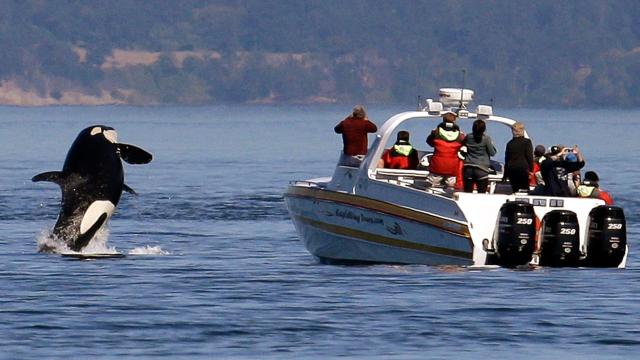New strategies to save boats from the orca uprising are in the works. Portuguese officials plan to test devices that could deter so-called killer whales from taking down ships with sound, according to a report from Lusa News Agency, Portugal’s largest news outlet. Trial runs of the tech could begin over the next few months or even sooner.
“Some lines of development of acoustic deterrents are being developed that will be tested this summer, in order to try to find options for protecting sailboats and minimise the number of [orca] interactions,” António Bessa de Carvalho, president of Portugal’s Associação Nacional de Cruzeiros (National Association of Cruise Ships), told Lusa.
The ANC is a public entity that promotes sport and recreational sailing in the country. The agency has reportedly been coordinating and meeting with the Portuguese Navy and Portugal’s national conservation institute to try to figure out a solution for the ongoing (and widely publicized) conflict between Iberian orcas and small to mid-sized sailboats.
The black and white marine mammals (which are technically the largest species of dolphin) have been damaging and sinking boats off of the Iberian coast since 2020. The odd behaviour, which appears to be intentional, often involves orcas nudging and ramming sailboats or yachts, and tearing off boat rudders. So far, killer whales have totally wrecked three boats in the waters near Spain and Portugal in recent years.
In one of the latest incidents, a group of three of the cetaceans sent a Swiss yacht, the Alboran Champagne, to a watery grave last month. All four people aboard were safely rescued. In fact, humans have remained unharmed in all of the hundreds of recorded incidents since 2020, wherein orcas have attempted to wilfully damage boats. Really, the whales’ focus seems to be squarely on the rudders, though why is still a mystery.
Scientists have been investigating possible causes for the orcas’ behaviour, and have yet to uncover anything definitive. A specific whale, named White Gladis, is believed to be behind many of the “attacks,” and to have passed the boat-bashing behaviour onto others.
One hypothesis for why the whales are targeting sailboats is that they’re seeking “revenge” for a past boat-inflicted injury. Though, as wild as this idea is, supporting evidence for it is scant. Other theories include that the whales are playing around — tearing off boat rudders for fun, are annoyed by the boats’ presence, or are simply engaging in a “fad” behaviour. Like humans, orcas have been known to adopt seemingly illogical habits because others around them are doing it — some biologists refer to this as culture. In one specific cultural display, Puget Sound orcas started carrying around dead salmon on their heads (like weird, smelly hats) in 1987. The fish fad began with a single female whale in a group named K-Pod and spread to two other pods over the course of 5-6 weeks. After a couple of months, the behaviour died down, according to a 2004 published, scientific account.
Maybe the yacht-yeeting behaviour will soon simmer down too, but until and unless that happens, humans are searching for a way to keep their boats safe. Enter: acoustic deterrents. Portugal’s recently announced plan isn’t the first time that sound has been deployed to repel marine life.
Personal anti-shark acoustic devices, marketed as a way to reduce the risk of shark attacks, have been around for years. Funnily enough, these gadgets mimic orca calls, as killer whales are a natural predator of the many-fanged fish. Fishing boats also often use high-pitched sound emitters to keep dolphins away from their haul and potentially dangerous nets. Suggestions to use such “pingers” to dissuade orca yacht attacks date back to at least 2022. In some instances, federal fisheries scientists have even resorted to banging pipes and firing off underwater firecrackers to scare orcas away from oil slicks during environmental disasters.
It’s unclear what specific devices or sounds Portuguese officials intend to use, if they have developed a new gadget, or plan to deploy existing tech. Will the yacht-rocking orcas be subjected to yacht rock? Gizmodo reached out to the ANC with questions about the acoustic proposal, and orca safety. The agency did not immediately respond, but this article will be updated with more information if they do.
Though the orca revolution is fun to post about on the internet, orcas — not billionaires — are probably most at risk if the boat bashing continues. The cetaceans already face numerous human-caused threats like climate change, pollution, and overfishing. Obviously, as a species, people are capable of doing more harm to killer whales than they can do to us. If the orca’s new ship-sinking hobby keeps up, researchers have expressed concern that humans may go on the offensive.
Despite the known harms of marine noise pollution, annoying sounds are probably one of the most humane methods boaters could use to keep their vessels and orcas safe.
